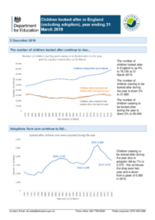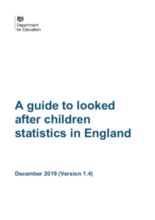

Displaying 671 - 680 of 1646
With an ambition of supporting the design of effective preventive child welfare measures targeting children in out-of-home care (OHC), the overall aim of this thesis is to examine education as a possible intervention path for improving their development and overall life chances.
This report reviews information on looked-after children in the UK at both national and local authority levels for the financial year 2018 to 2019.
On the 30th anniversary of the UNCRC and the Children Act, join the CFAB 2019 Annual International Child Protection Lecture.
The following article reports upon recent research, which explored the perceptions of professionals of the issues that affect the sexual and criminal exploitation of children in care, along with a discussion of the effectiveness of current responses to these issues and the challenges that professionals face.
The following article reports upon recent research that explored the perceptions of professionals of the issues that affect the sexual and criminal exploitation of children in care, along with a discussion of the effectiveness of current responses to these issues and the challenges that professionals face.
This article presents a critical review of research into post-adoption support in educational settings using a rigorous systematic methodology.
This document provides a guide to looked after children statistics published by the UK Department for Education.
The authors of this study investigated incidence of secondary traumatic stress (STS) and psychological predictors relevant to secondary and primary stress appraisal in UK foster carers.
Cross-sectional analysis by the Scottish Government show that the educational outcomes for looked after children are much poorer than for other children in Scotland. This presentation will discuss methods to create a longitudinal data set from these data and thus infer how a child’s lifetime history of care relates to their educational outcomes.
The first aim of this study was to investigate foster children’s social-emotional functioning (externalizing, internalizing and total problem behavior) reported by female and male caregivers, as well as by teachers, at 8 years of age, as compared with a non-foster group. The second aim was to investigate the predictive power of internalizing and externalizing behavior from age 2 and 3 years.



